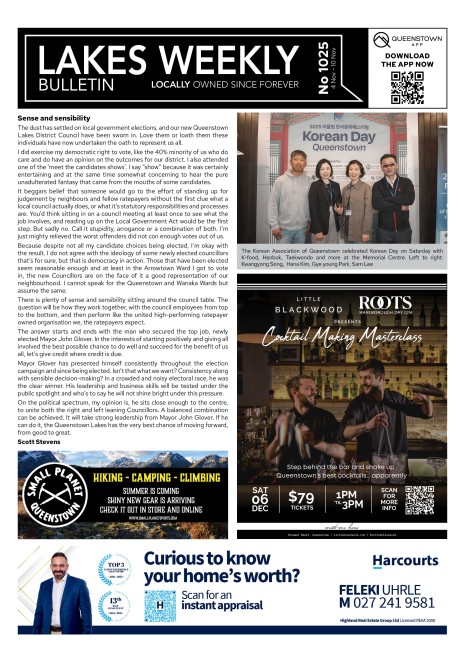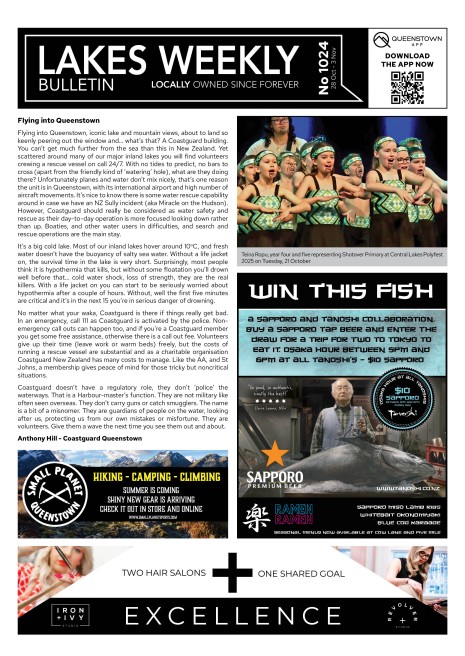Recession proofing your business

Many Queenstown tourism and hospitality businesses have enjoyed strong tourist numbers over summer but for many it’s extremely tough out there as a forecast recession is already starting to crunch.
Hot on the heels of post-Covid labour shortages, comes high inflation, rising interest rates, food and petrol costs, and rents, and for some businesses an excess in demand which creates its own problems.
Queenstown Findex partner Sarah Allely says some businesses are now heading into a contraction in demand as people faced with the effects of those higher rates and increasing costs cut back on spending. “We’ve been in a market where people have been adding capacity to their businesses and they’re going to have to take that offline,” Allely says.

Queenstown Findex partner Sarah Allely
“While tourism numbers are still strong for Queenstown they may not continue at the same rate, so whether it comes or not, it’s a good time to prepare for a storm,” she says.
Business owners, especially the less experienced, should gather as much good information about what’s going on in their business as possible – day to day, month to month, to identify the signs, threats, and risks in case the worst happens,” Allely says.
“Know your cashflows, do your contingency planning, know your risks, which could include big exposure to one client or customer. What would you do if they didn’t pay you next month? Know what to do to mitigate that before it happens.”
Businesses in distress tend not to act fast enough, plan enough or take steps to prepare. “It becomes difficult to be agile if you have wages to pay on Friday and there’s no money in the bank.”
It’s most painful when prices keep rising and customer demand starts to fall away.
Allely says it’s important to try and maintain revenue. “When spending is less and there are more competitors, you’ve got to be hungrier to fight for your share,” she says. It’s important to trim the fat and cut costs but not on things like advertising that will damage your turnover.
Maintain a good relationship with your bank and flexibility if you have debt. “Interest rates are high and everybody’s trying to pay down debt but maintain a facility with the bank to get that back if needed.”
Lifestyle toys, nice cars and boats have already been appearing on the market as people cut back.
“If you’ve borrowed to fund lifestyle things it can be difficult to get that cash back in times like this as there’s no demand.”
Keep credit under control and watch for any customers who are starting to pay you late. “Get paid half up front if you can,” Allely says.
Businesses have just come out of a period of ongoing challenges and people are getting a bit weary. Unfortunately, most people withdraw in stressful times like this as they’re busy and don’t know what to do. “You need a good team around you. Talk to your advisor, your bank, the key stakeholders around you. These times are cyclical. They won’t last forever.”
Weathering the economic storms – Survival tips from the veterans
How did successful, long-term Queenstown business owners weather the economic storms in our seasonal town?
Veteran tourism operator and Totally Tourism founder Mark Quickfall says have a robust plan and budget and stick to it. “Be agile and flexible as these events do come along. Run your business carefully, control costs and plan to have a credit line or cash reserve to fall back on,” he says.
People are now facing a cost-of-living crisis and paying increased interest rates, finding themselves there through no fault of their own, Quickfall says. It’s important not to over capitalise and expose yourself, or your business, to financial failure. “You can’t buy champagne every week, and there’s no point in selling a good Toyota to buy a Rolls Royce, invest in growth and income generating assets.”
Covid was the worst period he’s been through in business. “It was incredibly hard on everyone in tourism. 90% of our market disappeared overnight with no international visitors,” he says. “I admire everyone who dug deep and managed to survive the toughest period in tourism’s history.”
Long-time local boutique clothing retailers Terry and Erina McLean endured about five boom bust cycles in almost 25 years in business. They got creative and innovative, among the first to open seven days. “We concentrated on relationships with our regular shoppers from around Otago and Southland,” (Terry) McLean says. They took cartons of unsold clothing to Twizel – then a construction town, and to the Milford Sound Hotel staffroom, where they sold them off cheap. They stuck to the accepted mark-up and offered free garments if it could be bettered elsewhere in town.
Maintaining good relationships with suppliers who trust you is vital in tight times and (Terry) McLean says they will then see you through. Personalised service was also key. “If a new label outfit arrived, I’d ring someone I thought it would suit and whether they bought it or not, it brought them in, and they really appreciated it,” (Erina) McLean says.
Keeping a good advertising profile was also important.
Hansen’s Autos and Beaurepaires owner Mike Hansen the 1987 sharemarket crash saw skyrocketing interest rates of more than 20% and reputable business clients tip up, unable to pay him.
“We were unsecured creditors. We had to write off thousands of dollars and move on. It hurt a bit,” he says. “Inflation rose and if you sold a set of ignition points it would cost more to buy the stock than what you sold it for.”
He advises businesses to “stick to your knitting”. Those that are relatively well capitalised and resourced tend to survive. “When the sharemarket crashed it was no fault of those businesses. The way they were financed was the problem,” Hansen says.
Fly-by-nighters would arrive from the likes of Auckland thinking Queenstown’s streets were paved with gold then jump off and disappear. “Queenstown’s always been a boom-and-bust town.”
Longtime restaurateur and motelier Doug Champion advises getting rid of debt as soon as possible. “Don’t buy a Range Rover and boat without clearing debt. When we made it, we banked it for the harder times. Get some good advice and structure a plan to pay off debt with the bank and your suppliers,” Champion says. “Landlords, who pay no capital gains tax, need to be fair, and not all are.” He feels for businesspeople in this climate, with high borrowings and having just come out of Covid times.
“Every day is not Christmas in Queenstown. It’s very seasonal. Sometimes you’ve just got to hang in as the sun will come up tomorrow.”
Advertise in smart ways, he says.
Veteran Queenstown restaurateur Tony Robertson, now partner in a Nelson restaurant, says heading towards a recession can be very scary. “Don’t look outside your business at everybody else. Concentrate on improving your own market,” he says. “If you look at others, you’ll get so scared about what’s happening. You just see that train coming at you and it feels so hard. You can’t see a way out.”
“There will be lots of businesses everywhere teetering, some really old ones,” he says.
It’s important to “keep a war chest” in your business in the good times.
Camaraderie among restaurateurs is vital. “Stick together and support each other.”
“People who’ve gone through recessions before are only too willing to help,” Robertson says.
A former national vice president of the Restaurant Association, Robertson advocates leaning into its members’ support, including certain free legal advice, and discounts, also seeking help from Hospitality NZ.
Even though retired, he’s been helping three times a week rather than taking on extra staff at present.
“Hospitality is very difficult. You only live and die on your last meal.”









